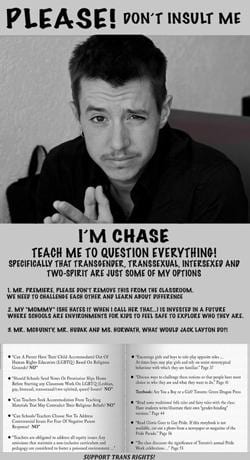
Chase Joynt's response to the Institute for Canadian Values ad. Click to enlarge.
SECOND UPDATE, SEPT 30 – The National Post apologized on Sept 30 for printing an advertisement from the Christian-right group Institute for Canadian Values and pledged to donate the proceeds from the ad sales to a group that works to advance the rights of lesbian, gay, bisexual and transgendered people.
The Post’s apology stresses that while it does not shy away from publishing unpopular political opinions, ads must “meet a standard of tone and respect that is consistent with furthering constructive dialogue about important public policy issues,” which the ad failed to do.
“Where the ads exceeded the bounds of civil discourse was in their tone and manipulative use of a picture of a young girl; in the suggestion that such teaching “corrupts” children, with everything that such a charge implies; and in their singling out of a specific group of people who have made choices about their sexuality with which the group disagrees,” the unsigned apology originally said.
Some activists complained that the Post‘s apology was also offensive because of its references to “people who have made choices about their sexuality,” implying that sexuality is a choice and because the original ad attacked people for their gender, not their sexuality.
The Post quickly revised the apology to remove the reference to choice, referring instead to “people with whose sexuality the group disagrees.”
A call to the Post to ask which queer organization would be receiving the donation was not immediately returned.
UPDATE SEPT 30 – Reports surfaced on blogs that the offensive ad first appeared in the Saturday, Sept 24 print edition of the National Post and that the ad ran nationwide, a fact confirmed by the Post‘s manager of advertising sales, Enzo Loschiavo.
Loschiavo says the Post is weighing its options and may run a retraction or apology for the ad.
A coalition of queer community groups has also drafted an open letter in response to the ad. The signatories, including Egale, the Lesbian Gay Bi Trans Youth Line, the 519 Community Centre, Sherbourne Health Centre, Rainbow Health Ontario, Queer Ontario, Fife House, Ontario AIDS Network, Black CAP and the Toronto People with AIDS Foundation, call on the leaders of Ontario’s political parties to denounce the ad and clarify “where each party stands on the position advanced” in it.
*
SEPT 29 – Social media outlets lit up on Sept 29 after a transphobic ad from the Institute for Canadian Values ran in the National Post.
The ad revives the “Stop Corrupting Children” campaign that launched last year to protest proposed revisions to the physical and health education curriculum that would include more sex education for younger children.
Under a picture of a young girl, the ad reads, “Please don’t confuse me. I’m a girl. Don’t teach me to question if I’m a boy, transexual [sic], transgendered, interesexed, or two spirited [sic].”
The ad calls on the leaders of the three major Ontario parties competing in the Oct 6 election to “stop teachers from confusing” the little girl, as she “face[s] enough in the world already.”
It then quotes extensively from a Toronto District School Board curriculum resource document called “Challenging Homophobia and Heterosexism,” presenting these optional lessons as mandatory.
Hundreds of tweets about the ad went out under the #canqueer hashtag on Twitter in less than 24 hours.
The National Post’s manager of advertising sales, Enzo Loschiavo, says the newspaper has received many complaints about the ad, and he’s not sure how it ended up in the newspaper.
“The Post wouldn’t generally run this,” Loschiavo says. “We’ll probably take a stance on not running it again.”
Loschiavo says the Post is investigating how the ad got booked and printed without being stopped, but he wouldn’t specify what the Post’s advertising standards entailed.
“We obviously don’t want to offend anyone, but we also understand that everyone has a freedom of speech,” he says.
Trans activist Chase Joynt was quick to respond to the ad by creating a spoof of it with his own face in place of the little girl’s.
“I thought it was manipulative to use the face of a small child,” he says. “Where the ad is doing the most damage is in not only presenting trans identities in any form as invalid and shameful, but also to rely on the education system to disseminate these lies.”
The Canadian Values campaign is particularly disappointing given that the province has yet to restart consultations or reintroduce its new curriculum as it had promised when it postponed the launch last year.
At the time, the Progressive Conservatives wanted the curriculum scrapped, and the New Democrats wanted it implemented. The Liberals have said that they would revise and reintroduce the curriculum following wider parent consultations. Former education minister Kathleen Wynne has told Xtra she expects the curriculum to survive consultations unchanged.
Joynt says the curriculum is necessary to help kids understand their own identities and how queer people fit into the community.
“What’s crucial about any curriculum in regard to identity politics is that it’s providing a breadth of options and potentially the inclusion of LGBT rights in any curriculum at any level is that it affords another opinion,” he says. “While I think there is opportunity to speak to things such as when is age appropriate, the ability to learn about those identities is integral to our success as educators.”
Charles McVety, whose Canada Christian College houses the Institute for Canadian Values, says he doesn’t believe the ad is homophobic or transphobic.
“We’re upset that the Ministry of Education would force our children to learn things that we don’t agree with and, secondly, that they will not allow us to withdraw our children [from the lessons],” McVety says. “Eight-year-olds are very impressionable, and to confuse an eight-year-old is egregious.”
He also says the new curriculum is not an appropriate way to deal with homophobic bullying or the rash of gay teen suicides.
“If you are going to deal with the issue of bullying, which I think needs to be dealt with, you deal with bullying. You don’t deal with other topics in the name of bullying. My daughter has red hair; she gets bullied because of her red hair,” McVety says. “There’s so many reasons why a child can be bullied; you don’t teach every little aspect. That appears to be the wedge to get this indoctrination into our classrooms, and we’re upset about it, and I don’t think it’s civil. I don’t think it’s respectful.“
The ad is not currently running in any other newspaper or magazine, but it is viewable on the campaign’s website. McVety says he is “not sure right now” if he’ll try to place the ad elsewhere in the future.
Joynt has created a Facebook page to organize critics of the ad to coordinate a response. More than 150 people have joined.
He says his hope is to raise enough money through the group to buy a full-page response ad in the Post.
Queer Ontario has also urged its members online to file complaints with Advertising Standards Canada, the national advertising self-regulating body.
In an open letter to the National Post, Cliks lead singer Lucas Silveira writes that he is asking the Ontario Human Rights Commission to pursue a hate propaganda investigation against the Post and the Institute for Canadian Values over the ad. Current interpretations of Canadian human rights legislation tend to exclude consideration of advertisements in the media, according to Silveira’s lawyer.


 Why you can trust Xtra
Why you can trust Xtra


